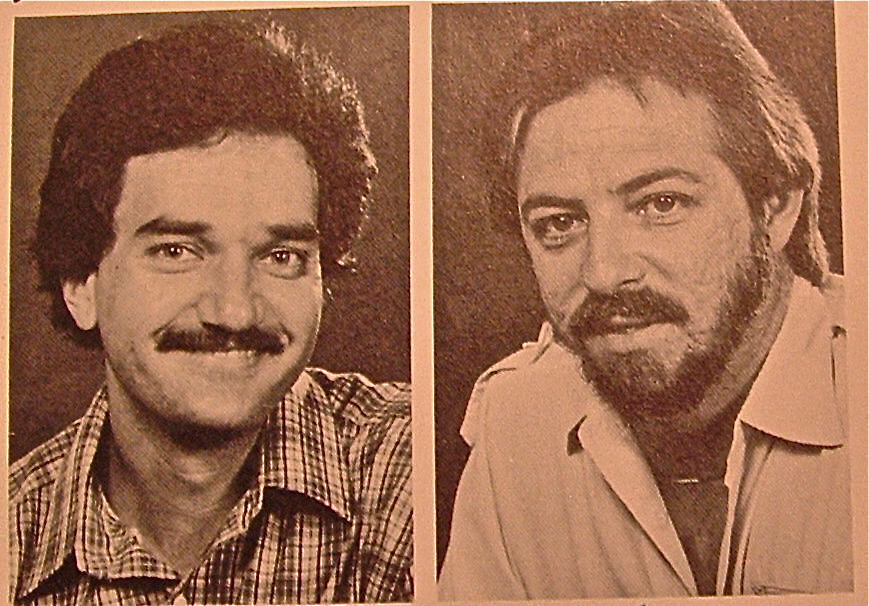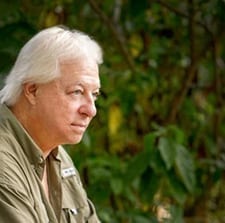When the Border Boys Were Young
May 22, 2024By Tom Poland
Before the photos, Robert Clark had been photographing architecture for ten years. I had been writing scripts for documentaries. Much earlier, during a teaching stint, I submitted a paper to an academic journal. That earned me an invitation to speak in Kansas City, Missouri. I turned the offer down. Grinding out dry treatises was not, and would not be, my cup of tea.
In short, I left full-time teaching and found my calling. Back when we were young, Robert’s path and mine crossed at a natural resources agency. I wrote the aforementioned scripts, and Robert photographed wildlife. Later I joined the agency’s magazine staff where editors and designers combined words and images to craft features about man’s relationship with nature. After three years of staff meetings but not one chance to work together, Robert suggested we take a day off and hit a back road.

Photographer Robert Clark, left, and Tom Poland, writer, right. Photo by Jim Goller
“We’ll find a story we both like,” he said.
That we did. “Tenant Homes, A Testament To Hard Times” chronicled plain folk’s hardscrabble life. In one shack, an elderly lady had scraped by selling lye soap and “flowers” cut from pink and mint green Styrofoam egg cartons. She had died two weeks earlier and her unfinished work lay among rat pellets. Her story lives on, here even.
Several months after the publication of “Tenant Homes,” Warren Slesinger, acquisition editor with the University of South Carolina Press called. “I read the story you and Robert did, and if you have more stories like that, I have a book contract for you.”
We did, and he did.
That was thirty-five years and six books ago, our latest release being Carolina Bays: Wild, Mysterious, and Majestic Landforms (Jan. 2020). Over seven years we logged 10,000 miles across North Carolina, South Carolina, and Georgia, observing and photographing Carolina bays. Of the book these words were written. “There is a strange beauty at the heart of every mystery, and the mystery of the Carolina Bays is an enigma that is lushly, uniquely beautiful. How did these odd features come to be formed in the landscape in the first place, with their uniform shapes and matching elliptical orientations scattered across the Carolinas? There are many hypotheses but no definitive answers.”
Our latest work will be out early in 2025. For now, it’s a secret.
Today we cover back roads, dying farms, abandoned churches, shuttered country stores, nature, of course, and winsome places like gristmills, kudzu-covered trucks, feed and seed stores, covered bridges, and forgotten bridges. Like me, Robert prefers the road less traveled, and it’s there he captures images you cannot forget.
“There’s a reason you’ve seen Robert Clark’s photographs in the pages of National Geographic books, a reason you remember them long after you’ve turned the page. Clark’s work captures more than the look of a place; it communicates the mood.” —Chicago Tribune
“Tom Poland is an inquisitive man who keeps an eye out for extravagant chunks of nature, disappearing cultures, and people who are salt of the earth. He has ridden those so-called back roads for years chewing foods, sipping drinks, absorbing stories and documenting his finds. Change is what Poland touches upon frequently.” —Wayne Ford of the Athens Banner Herald
What we do is not work, but as Robert said, “It requires discipline.” Our bosses are weather, the clock, and deadlines. Robert works at sunrise and sunset to capture the magical light, and the nine hours a day I put in isn’t work, not when you love what you do.
It’s been half a century since I picked up the pen; half a century since Robert slung a camera around his neck, an odd thing. Robert grew up dreaming of being a writer, and I grew up dreaming of being a photographer. In a reversal of dreams, I became a writer and Robert became a photographer.
Today, we both write and photograph, together and apart. Think of us as the Border Boys. Robert’s from Charlotte, and I’m from Lincolnton, Georgia. Two outsiders on the inside now for fifty years.
Georgia native Tom Poland writes a weekly column about the South, its people, traditions, lifestyle, and culture and speaks frequently to groups in the South. Governor Henry McMaster conferred the Order of the Palmetto upon Tom, South Carolina’s highest civilian honor, stating, “His work is exceptional to the state.” Poland’s work appears in books, magazines, journals, and newspapers throughout the South.
Visit Tom’s website at www.tompoland.net
Email him at [email protected]























